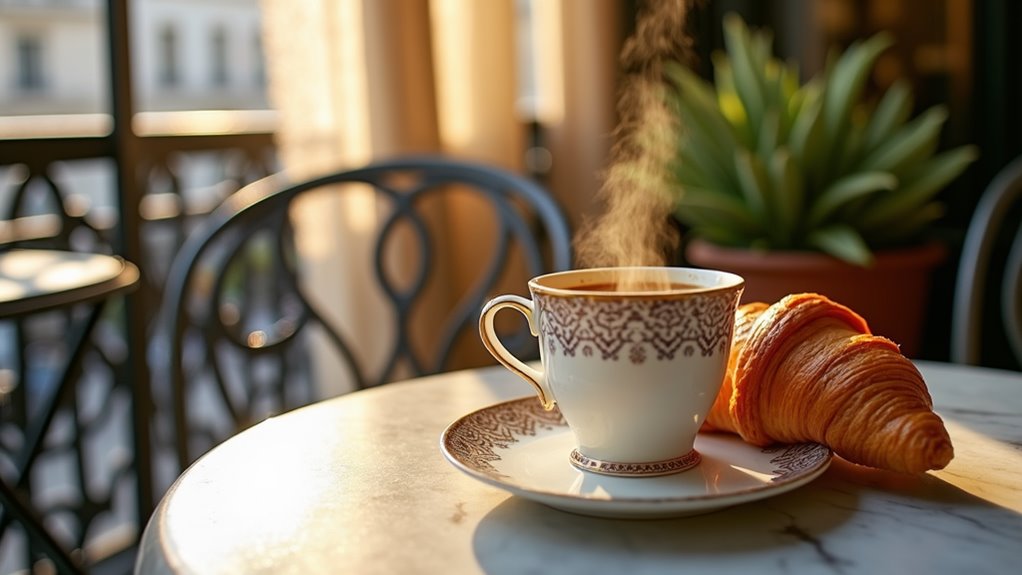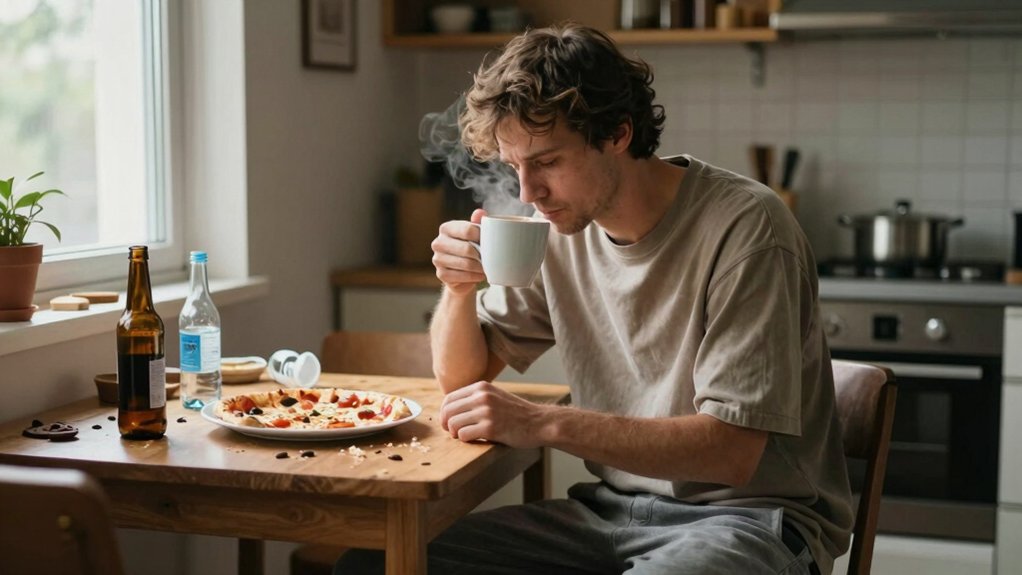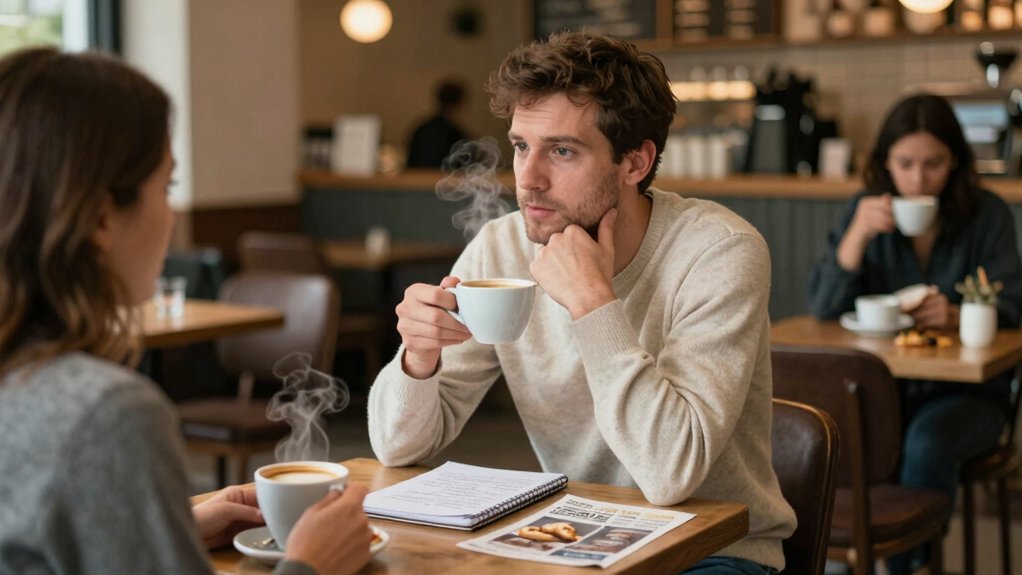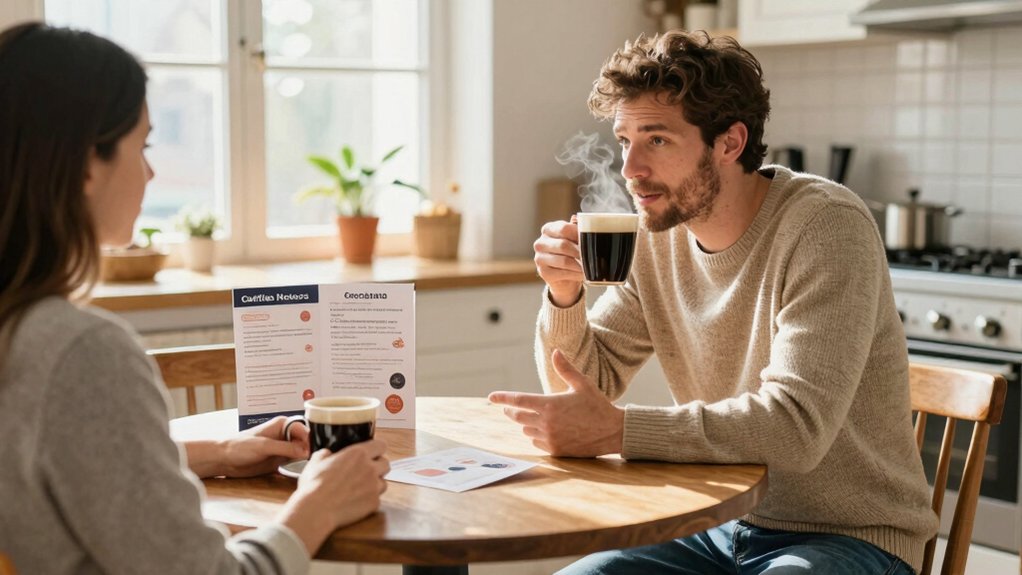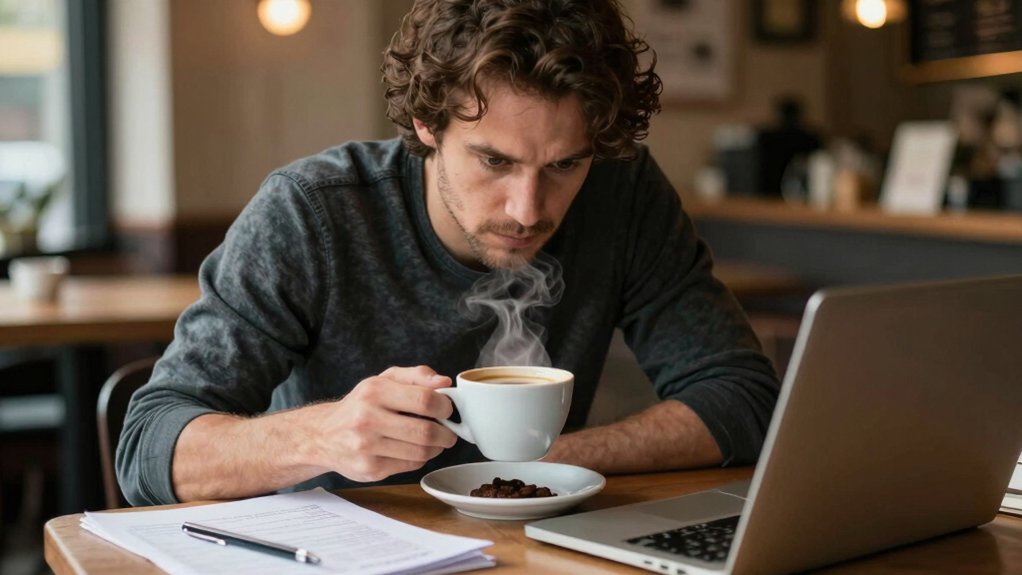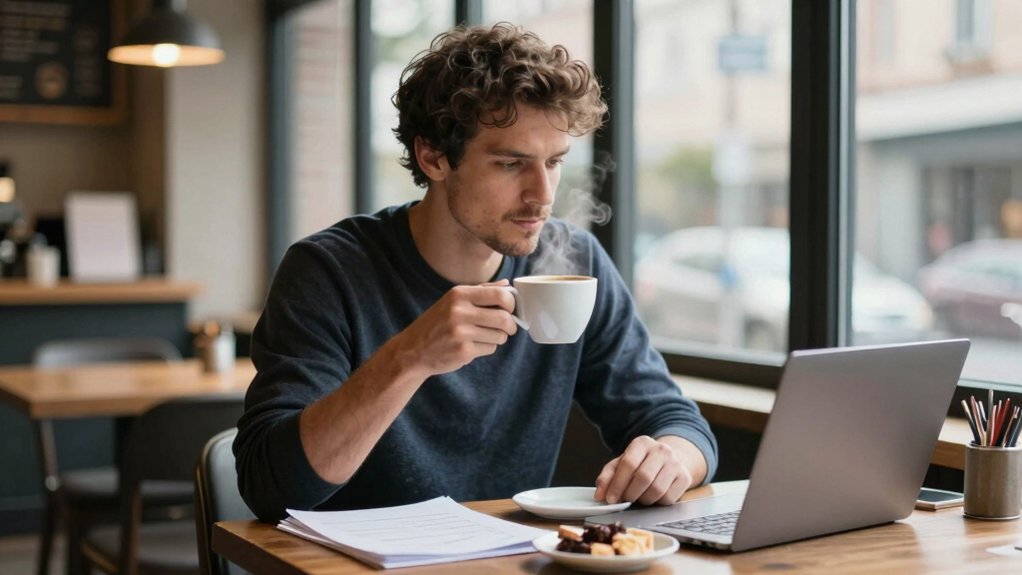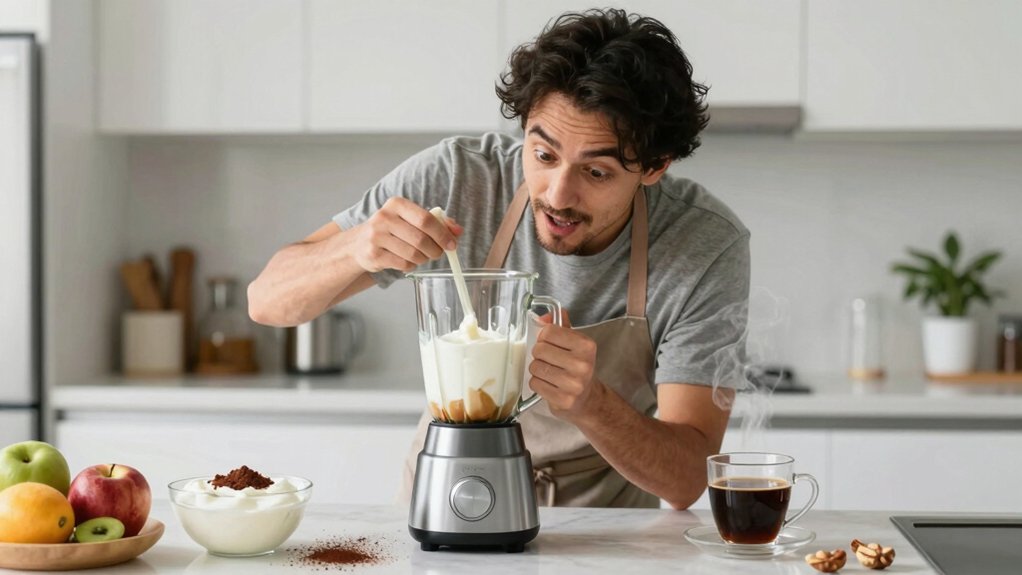French coffee is more than just a drink; it’s an experience, and I think you’ll love it. The French have perfected the art of slowing down and truly savoring each sip.
Ever wondered why a café crème or a café noisette feels so special? It’s not just the taste but the charming vibe of a Parisian café that makes it magical.
Join me as we dive into what makes French coffee culture unique and why it’s adored by so many around the globe.
Table of Contents
Origins of French Coffee
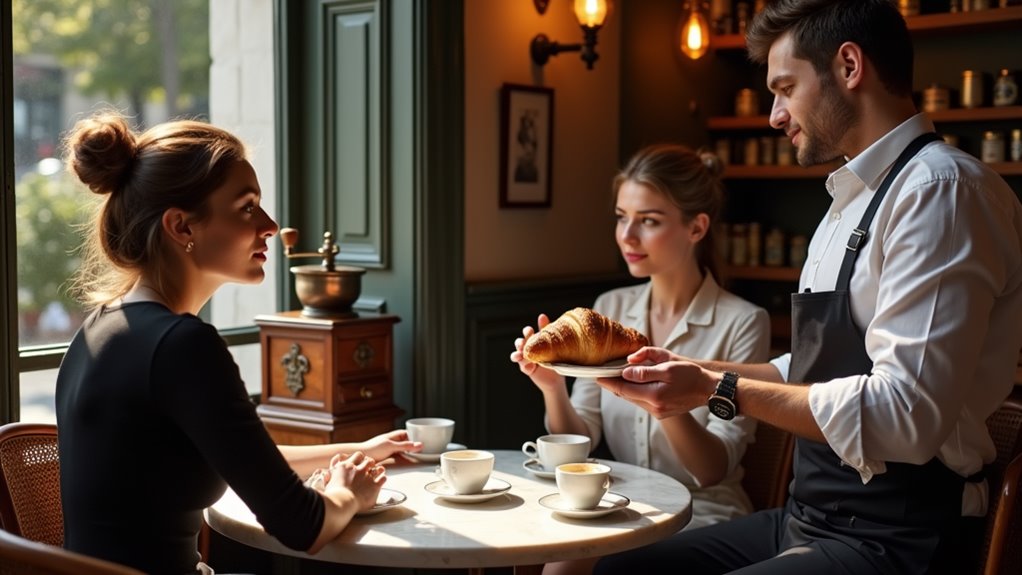
In the early days of French coffee, the journey began in 1644 when Pierre de La Roque brought coffee beans to Marseille, marking the introduction of this exotic beverage to France. Imagine the excitement of tasting something so new. By 1657, Jean de Thévenot was sharing this delight in Paris, teaching others how to brew it.
Then, in 1669, Suleyman Aga, a Turkish ambassador, expanded the enthusiasm by bringing a sizable amount of coffee and the necessary equipment for making Turkish-style coffee. This experience must’ve been transformative, revealing coffee’s rich flavors. The proliferation of Parisian cafés in the 1670s further cemented coffee’s popularity, integrating it into French culture and leading to the creation of iconic beverages like café au lait.
Parisian Coffee Houses
Picture yourself in the heart of Paris, where the aroma of freshly brewed coffee wafts through the air, leading you to the historic cafés that define the city’s vibrant culture.
Picture strolling into Café Procope, where Voltaire’s wit once echoed, and Benjamin Franklin might’ve hatched revolutionary ideas over a cup of coffee. These cafés were the intellectual hubs of their time, teeming with artists and thinkers. As the oldest café in Paris, Café Procope holds a special place in the city’s coffee culture history.
Today, the charm of Parisian coffee houses remains irresistible.
- Café Procope: Oldest café, a meeting spot for Enlightenment thinkers.
- Café de Flore: A haven for writers, still vibrant with its art-deco interior.
- Les Deux Magots: Fosters creative exchanges amid a timeless setting.
- Palais Royal: Once a hotbed of political discourse and coffee culture.
Every corner tells a story.
Popular French Coffee Types
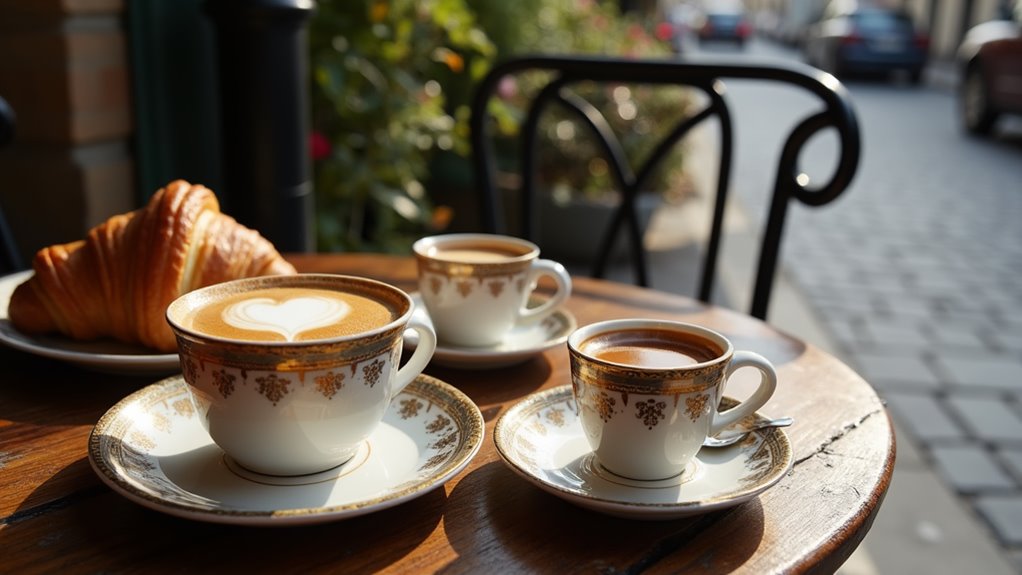
Let’s explore the delightful world of French coffee, where each type offers its own unique experience. When I first tasted a café, I loved its rich, bold flavor in a small cup. If you’re looking for something milder, try a café allongé-think of it as an Americano’s French cousin. For a touch of creaminess, café noisette is perfect with its hint of milk, giving it a lovely hazelnut hue. Although the French press is a popular brewing method globally, it is not typically used in French coffee culture, which predominantly favors espresso. Here’s a quick overview:
| Coffee Type | Description |
|---|---|
| Café | Espresso in a small cup |
| Café allongé | Espresso with hot water |
| Café noisette | Espresso with a dash of hot milk or cream |
| Café crème | Espresso topped with steamed milk |
Don’t miss out on a café déca if you prefer decaf! Each coffee offers a slice of French culture.
Enjoying Coffee the French Way
French coffee culture is all about savoring the moment. Imagine sitting in a cozy café, with an espresso in hand, taking in the world around you. In France, coffee isn’t just a drink-it’s an experience. We don’t rush through it; instead, we take the time to enjoy every sip. Here, coffee is often enjoyed leisurely, never on the go.
Espresso reigns supreme: It’s the go-to choice, especially post-meal.
Milky coffees: Best reserved for breakfast or a late-morning treat. No food pairings after morning: Except maybe a simple croissant.
Ambiance matters: The setting enhances the experience. This approach makes coffee time an essential part of the day, not just a caffeine fix.
French cafés became key locations for political discussions and cultural exchanges, contributing to their significance beyond just serving coffee.
The Italian coffee culture emphasizes quality and tradition, similar to how the French enjoy their coffee with a focus on experience and ambiance.
Cafés as Social Hubs
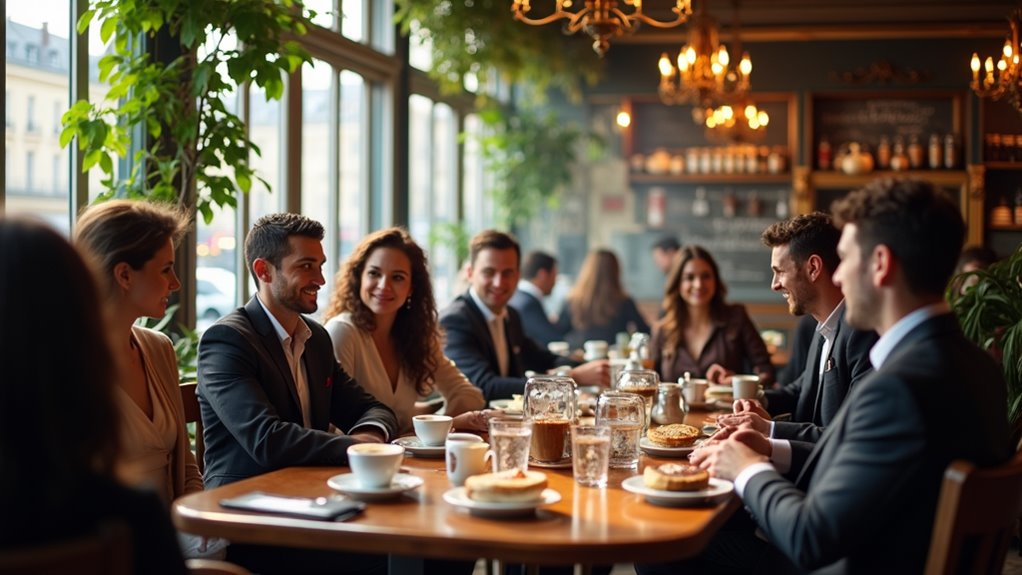
Amid the bustling streets of Paris, cafés have long been the heartbeats of social interaction, serving as vibrant social hubs throughout history. I find it fascinating how the first café opened in 1672, but it was Café Procope in 1686 that truly set the scene. Fast forward to the 18th century, and you’d see nearly 1,000 cafés by 1750, buzzing with artists and intellectuals like Voltaire.
Today, these spots are essential to French life, where everyone from students to retirees gathers. Cafés have historically been significant as hubs for intellectual discourse, nourishing both the mind and body with animated discussions and cultural dialogue. Whether you’re in a chic Parisian café or a quaint village spot, cafés offer a sense of community and inclusivity. They’re more than just places to sip coffee; they’re where connections are made and stories are shared.
Coffee’s Historical Influence
In the mid-17th century, coffee began its journey into French culture, shaping not just the nation’s tastes but its social and economic landscapes.
It all started in Marseille, thanks to Pierre de La Roque in 1644. By 1669, as coffee made its way to Paris with Turkish ambassador Suleyman Aga, the French capital embraced it wholeheartedly. By the late 17th century, coffee gained popularity among intellectuals, becoming a staple in social gatherings and discussions.
Fast forward, coffee wasn’t just a drink but a symbol of intellectual conversation, especially among Parisian thinkers.
- Coffee’s introduction to French colonies like Guiana and Saint-Domingue led to massive coffee production by the 1780s.
- Louis XIV’s coffee plants in 1715 expanded global coffee cultivation.
- Coffee innovations, like the first coffee maker in 1800, revolutionized preparation.
- François Damame’s 1692 license marked coffee’s commercial triumph.
Modern Coffee Practices
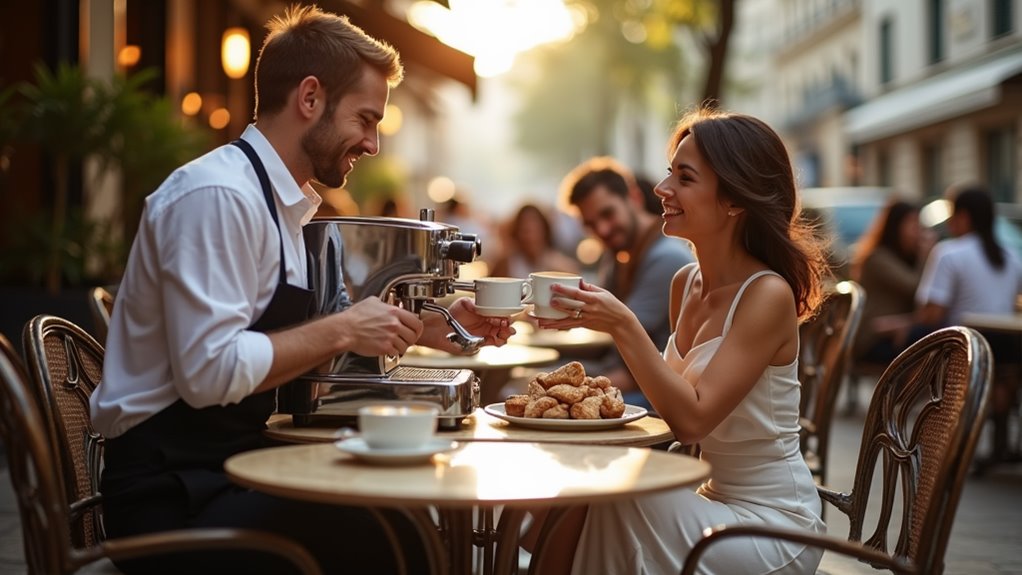
Modern coffee practices in France reflect a deep-rooted cultural tradition that emphasizes the experience over the beverage itself.
Picture yourself at a bustling café, where ordering at the bar means a quick espresso, while sitting at a table invites leisurely conversation. Always start with a friendly “bonjour” to the waiter-it’s essential.
French cafes rarely offer takeout, encouraging you to savor your coffee on-site. The French café culture also provides a space for relaxation and socializing, catering to non-coffee drinkers with options like herbal teas and soft drinks.
Milky coffees like café au lait are reserved for mornings; having them later might earn you puzzled looks. Espresso-based drinks dominate, from the classic café to the creamy café crème.
The French roast delivers a dark and smoky punch, perfect for those who enjoy bold flavors.
French cafes serve coffee swiftly, yet the focus remains on slowing down and enjoying each moment.
Pairing Coffee With Food
Pairing coffee with food can elevate your palate’s journey. Imagine a delicate fruit tart paired with a mild, light coffee, where the subtle flavors dance in harmony. A strong espresso with a rich, chocolatey éclair is an indulgence you won’t forget. The warmth of coffee elevates the indulgence of pastries, making each bite and sip more pleasurable.
Picture the buttery flakiness of a croissant with a mild filter coffee, or a creamy cappuccino enhancing the freshness of a fruit tart. Each combination offers a unique flavor experience. The mineral content in your water can significantly impact the flavor profile of your coffee, enhancing or hindering the overall tasting experience.
- Balance the flavors; neither should overpower.
- Fresh ingredients enhance the experience.
- Explore various roasts and pastries.
- Consider coffee’s acidity and bitterness.
These pairings bring out the best in both coffee and pastry.
Coffee Culture’s Global Impact
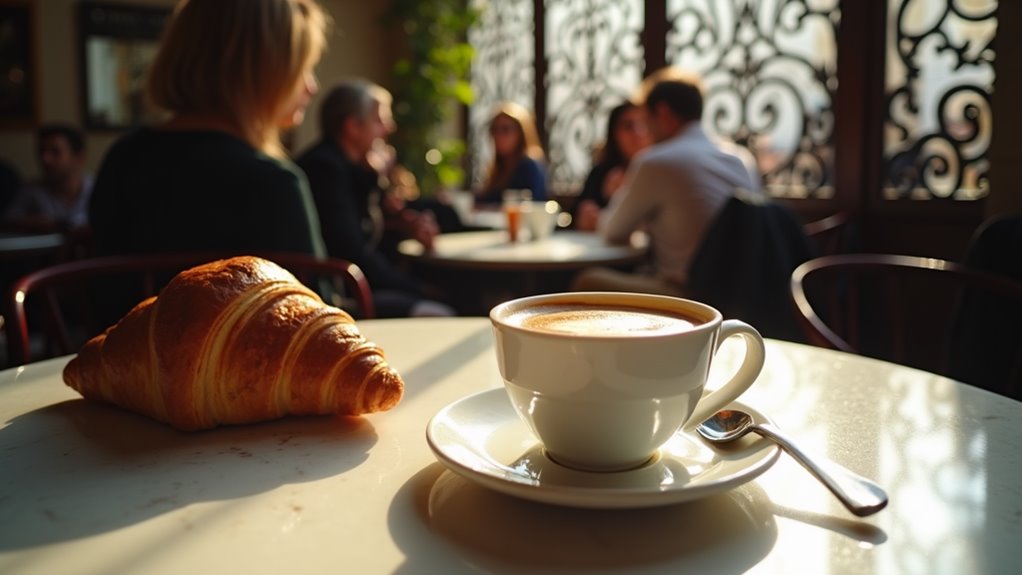
Coffee culture has profoundly shaped global markets and social practices, and France stands at the heart of this transformation. I’ve noticed how French cafés influence coffee trends worldwide, focusing on quality and social interaction. Specialty coffees have taken off, making up 4% of the market in 2020 and expected to hit 10% by 2025. That’s impressive growth! In France, coffee isn’t just a drink; it’s a lifestyle. I love how out-of-home consumption is a big deal, with many visiting cafés multiple times a week.
Despite the pandemic, the market adapted, with to-go options soaring from 22% to 34%. Sustainability matters here, too-61% of French consumers are into ecological solutions like compostable pods. It’s interesting to see that 73% of French people consume coffee regularly, further highlighting the deep-rooted coffee culture in the country. The emphasis on quality and sustainability is inspiring. One can draw parallels between the consistent performance of high-quality drip coffee makers and the French dedication to quality in their coffee culture.
Frequently Asked Questions
How Do French People Typically Prepare Coffee at Home?
I boil water, clean my French press, and coarsely grind fresh beans. I use the right coffee-to-water ratio, steep for 6-8 minutes, then press slowly. Enjoy immediately for a rich flavor.
Are There Any Unique Coffee Festivals in France?
I can’t find unique coffee festivals in France. Coffee usually appears in wider food festivals, not as standalone events. French café culture thrives without them, as coffee is an integral part of daily life.
What Is the Role of Coffee in French Fashion Culture?
Coffee is key in French fashion culture, merging style and socializing. Parisian cafes are trendy spots where fashion, chat, and coffee meet, showcasing a passion for leisure and elegance.
How Has Technology Affected French Coffee Consumption?
Tech has changed my coffee habits in France. Smart machines at home and NFC payments in cafés make getting my perfect brew quick and easy.
Are There Regional Coffee Preferences Within France?
In Northern France, they prefer rich, dark roasts and espresso. The South opts for lighter roasts influenced by Italy. Paris loves specialty coffee, while rural areas stick to strong, traditional espressos.
In Conclusion
French coffee culture is a delightful journey, where savoring each cup becomes a cherished ritual. Whether you’re enjoying a creamy café crème in a cozy Parisian café or sipping a café noisette with friends, it’s all about the experience.
I’ve found that these moments encourage meaningful conversations and connections. Plus, with France’s shift towards sustainable practices, you can enjoy your brew guilt-free.
So, why not embrace this leisurely approach and let each cup be a moment to savor? Trust me, it’s a simple pleasure worth indulging in.

